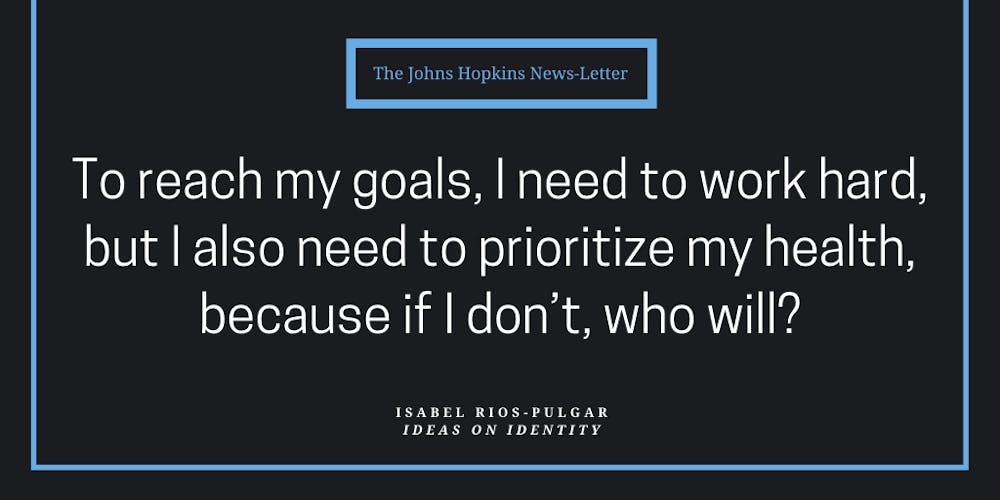
Life has a funny way of teaching you a lesson sometimes.
When I was little, I was solely focused on being the best: the best student, the best friend, the best daughter, the best everything. I would do whatever it took to meet that goal. Sleepless nights, high levels of stress and infinite hours of overcommitment became my life.
I did reach those goals though. I was at the top of my graduating class, I had a great group of friends (whom I still talk to today), I was on as many club executive boards as possible and I got into Hopkins. In my eyes, I was successful, and I wanted to keep it that way. And so, I did.
Within my first year at Hopkins, I already had my sights set on grad school, on a PhD, on a big salary with multiple zeroes in it. I dreamt of being well known for my research — of doing something incredibly groundbreaking. So I applied the same formula that got me into Hopkins: work hard, no matter the cost.
Then, in August of last year, on the very first day of my junior year, the first of a series of 104 degree fevers that would last until the end of November hit. I would wake up in a cold sweat, with rashes and swelling, every morning. Still I tried my best to go to class, attend research and produce results at work. The Baltimore cold did not help, and I felt like a bad student and research assistant, calling out sick from commitments every week. There were days I could not get out of bed due to joint pain, lightheadedness or just plain hopelessness at what had become my “new normal."
After multiple hospital visits that ended with 80 pages worth of negative test results and no diagnosis, I thought myself a lost cause and a burden to my roommates. They would take care of me, wipe my tears away and on the worst days, make me breakfast and feed it to me. I was worrying everyone I cared about, and the guilt I felt ate at me. I kept thinking this nightmare was just never going to end.
When I traveled home to Miami for Thanksgiving break, my parents took me to the Nicklaus Children’s Hospital, where I would stay for three weeks. The doctors there lierally saved my life. I was diagnosed with lupus nephritis, an autoimmune disease with no known cure that attacks the kidneys, among other organs.
At first, I was furious. I would look back, thinking if my first doctors hadn’t been so careless, maybe my lupus would not have affected my kidneys. I thought I would never go back to my normal life, that others would always see me as “sick” or “helpless.” I saw chronic illness as an obstacle, blocking me from my goals, from my success.
It took being sick to realize that the stress and pressure that I was putting on myself was essentially killing me. With my diagnosis, I realized the value of self-care. I finally understood what one of my closest friends means when she says, “Thoughts become words, words become actions.” My internal conversation was toxic, constantly putting myself down when I didn’t complete a task to perfection. I needed to reintroduce myself to me, to be gentle with my body while it recovers from months of physical trauma.
Prior to my diagnosis, my definition of success was always a destination, far into my future that I inched closer to with every effort I made. But I was wrong: Success is not in a place, out of reach and far from today. Success is in the every day. It’s in getting out of bed, in making my friends smile, in being patient with myself and my body. I feel successful when I make myself breakfast, when I meditate, when I express gratitude, when I sing off-key to my roommates’ pets, when I call my parents, when I help someone else and when I ask for help.
I don’t take care of myself because I have lupus. I take care of myself because I am human, and I deserve to rest. I still have big dreams of going to grad school and making an impact, but I now know that I can’t do that unless I take care of myself first. To reach my goals, I need to work hard, but I also need to prioritize my health, because if I don’t, who will?





